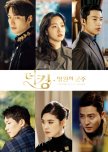how ideological constraints can limit narrative freedom
This movie is still one of the best in K-Ddramas: you can see that they really pulled out all the stops with the budget, visuals, top-tier casting, one of the best hit screenwriters, top directors, and beautiful music.
The movie is truly well done, and you watch it until the end. All the characters are well developed. I really like the two lead actors, as well as the supporting ones. As with most sci-fi films, it's hard to write something that is 100% coherent, so there are many plot holes... but maybe it's all about just one message: that you have to live, love, and enjoy every day, not think about the future, and live in the present? Committing to love for a day equals loving for eternity.
It's nice, it's romantic, but I wonder, as someone who's not Korean, if I still see propaganda in certain ideologies, which I think harms the artistic side of the work, especially regarding the plot. Why is it that in Korean dramas, characters often don't want to have children? Like getting pregnant, for example? The propaganda mostly focuses on work, personal comfort without making compromises (I think love requires a little effort, and a balance or equilibrium is good), and there's also a patriotic element about not leaving the country. ’m writing this because I see it systematically in many dramas. It’s great to incorporate a message into the storyline, but changing the narrative just to push an agenda is unacceptable for me.
[spoiler] At the end of the story, the female character could have logically married the male lead as proof of their commitment. She could have visited her father and friends on weekends, like an adult managing her life, right? But the writer avoids taking risks. It feels like they don’t want to show her choosing a more personal life, because it would suggest she prefers a life of luxury, a "king," over her country and the republic it represents. She avoids leaving her country or job, which aligns with this patriotic message— [END SPOILER] working for the state and doing the hard jobs no one else can do. This pattern is seen in other works by the same writer, like Descendants of the Sun, or other k-dramas, such as Crash Landing on You. In both cases, the stories fall into similar traps, forcing the characters to stay within these ideological confines, which ultimately weakens the plot.
This critique highlights how ideological constraints can limit narrative freedom, making storylines feel forced or unrealistic.
Another issue with this drama is the excessive product placement; entire scenes revolve around showcasing products rather than advancing the plot. I get that they need to finance the stars, but it's a bit much, isn’t it?
Lee Min Ho has crazy charisma, Kim Go EUN she act really well ! and the others are perfect too ( Kim Kyung, Do Hwan, Young Ok,
The movie is truly well done, and you watch it until the end. All the characters are well developed. I really like the two lead actors, as well as the supporting ones. As with most sci-fi films, it's hard to write something that is 100% coherent, so there are many plot holes... but maybe it's all about just one message: that you have to live, love, and enjoy every day, not think about the future, and live in the present? Committing to love for a day equals loving for eternity.
It's nice, it's romantic, but I wonder, as someone who's not Korean, if I still see propaganda in certain ideologies, which I think harms the artistic side of the work, especially regarding the plot. Why is it that in Korean dramas, characters often don't want to have children? Like getting pregnant, for example? The propaganda mostly focuses on work, personal comfort without making compromises (I think love requires a little effort, and a balance or equilibrium is good), and there's also a patriotic element about not leaving the country. ’m writing this because I see it systematically in many dramas. It’s great to incorporate a message into the storyline, but changing the narrative just to push an agenda is unacceptable for me.
[spoiler] At the end of the story, the female character could have logically married the male lead as proof of their commitment. She could have visited her father and friends on weekends, like an adult managing her life, right? But the writer avoids taking risks. It feels like they don’t want to show her choosing a more personal life, because it would suggest she prefers a life of luxury, a "king," over her country and the republic it represents. She avoids leaving her country or job, which aligns with this patriotic message— [END SPOILER] working for the state and doing the hard jobs no one else can do. This pattern is seen in other works by the same writer, like Descendants of the Sun, or other k-dramas, such as Crash Landing on You. In both cases, the stories fall into similar traps, forcing the characters to stay within these ideological confines, which ultimately weakens the plot.
This critique highlights how ideological constraints can limit narrative freedom, making storylines feel forced or unrealistic.
Another issue with this drama is the excessive product placement; entire scenes revolve around showcasing products rather than advancing the plot. I get that they need to finance the stars, but it's a bit much, isn’t it?
Lee Min Ho has crazy charisma, Kim Go EUN she act really well ! and the others are perfect too ( Kim Kyung, Do Hwan, Young Ok,
Cet avis était-il utile?





